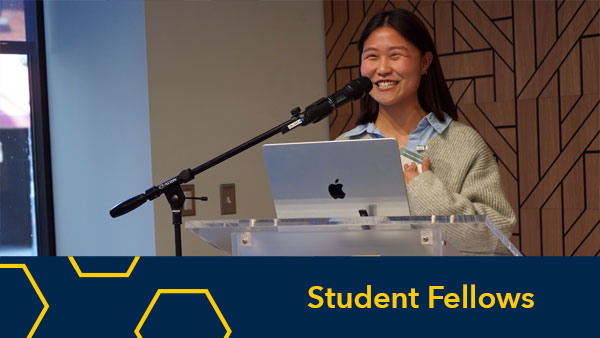Chelsea Chandler, Learning Experience Designer
@ChelsbChand
Rebecca Quintana, Learning Experience Design Lead
@rebquintana
Yuanru Tan, Learning Experience Designer and Accessibility Coordinator
@YuanruTan
Nichole Yang, Learning Experience Design Fellow
In the spirit of pursuing inclusive online learning experiences offered by the Center for Academic Innovation, the Learning Experience Design (LXD) team set out through the summer to map the ways in which initial Diversity, Equity, and Inclusion (DE&I) goals are manifested in online learning experiences in our portfolio. With the University of Michigan’s renewed focus on DE&I and the growth of the Michigan Online portfolio, our team believed it was time to evaluate our progress, identify challenges, and search for opportunities to continue to strive for inclusive design.
A Little Bit About MOOCs and Diversity, Equity, & Inclusion
When massive, open, online courses (MOOCs) were first introduced into the educational landscape, words such as “disruptive” and “revolutionary” were used to describe their impact on access to elite universities, researchers, and scholars (Carver & Harrison, 2013). The assumption was free, online learning experience would overcome barriers to access. Unfortunately, equitable and inclusive access for diverse learning communities in MOOCs have not always been realized, beyond the concept of providing free access to content (Ebben & Murphy, 2014). With a bit of team introspection, and a good amount of action, we are continuing to iterate on our inclusive design efforts.
What We’re Doing
Our work began by searching for a framework for inclusive design. Luckily, U-M’s own National Center for Institutional Diversity (NCID) offers a statement and guiding questions to support diversity research and scholarship (NCID, 2019). We modified the statement and guiding question language as a tool to deductively analyze previously submitted MOOC proposals featuring goals related to DE&I. In addition to including DE&I goals, we selected courses that fell into the open content category (i.e., with no restrictions on enrollment) and were “live” at the time of review. As a team, we analyzed the DE&I portion of 12 proposals (six single MOOC proposals and six proposals for course series). Our analysis involved three phases: proposal selection, coding proposals using the modified NCID framework, and reviewing live courses for evidence of the enactment of DE&I goals.
While our research is not yet complete, our first pass at artifact analysis involved examining all aspects of each individual, stand-alone MOOC (i.e., a MOOC that is not part of a series), including course syllabi, video transcripts, discussion prompts, course readings, and assessments. We looked for instances in which the proposed DE&I goals were integrated into the content examined in the course.

What We’ve Found…So Far
Preliminary results of the stand-alone MOOC analysis suggest that during the MOOC proposal process there are certain DE&I goals that are more prevalent than others. The table below includes the results the initial proposal analysis and the goals featured in proposals.
Goal |
Description |
Number of Proposals |
| Addressing Social Inequality | Emphasize historical and contemporary issues of social inequality across contexts and life domains. | n=6 |
| Including Multiple Perspectives | Commit to include epistemological perspectives of those from disenfranchised populations within the content. | n=5 |
| Recognizing Impact of Power and Privilege | Promote understanding and awareness of systems of power and privilege and how these systems interact with groups historically underrepresented and marginalized based on identities including but not limited to race, ethnicity, gender, social/economic class, culture, sexual identity, ability, status, and religion. | n=4 |
| Valuing Individuals | Commit to utilizing inclusive pedagogies. Proposal seeks to value and incorporate the lived experience of learners who are represented in the course . | n=4 |
| Finding Common Ground | Address challenges that arise when individuals from different backgrounds and frames of reference come together. The proposal demonstrates attunement to the variability in opportunities across significant societal contexts. | n=1 |
Following the initial proposal analysis, we reviewed the associated courses to gain an understanding of which goals were enacted and in what ways (e.g., through syllabi, videos and transcripts, discussion prompts, course readings, external resources, assessments, and learning activities). One course in particular stood out among the rest with a total of 11 manifestations of three types of proposed goals: addressing social inequality, representing multiple perspectives, and valuing individuals. The majority of the DE&I goals proposed for this course were enacted via learning materials, such as course videos. Notably, the design of the course and learning materials were created in a clear and purposeful way in alignment with the original DE&I goals detailed in the proposal. Other courses reviewed also included a variety of learning materials and activities related to DE&I; however, unlike the course mentioned above, it was not always clear that there was a connection between proposed goals and the design of the courses.
While the initial analysis sheds light on the overall process of proposed DE&I goals and their enactment in courses, there appears to be somewhat of a disconnect between the goals and the course design. Further content analysis will hopefully reveal patterns into how goals were translated into courses during the design phase.
What Do the Results Mean?
As leaders of course design efforts, it is important for LXDs to ensure DE&I goals are purposefully realized in courses. However, impeding factors likely include the complexity of the design and production process, the number of people involved throughout the process, and the passage of time between the proposal and design phases. Additionally, faculty and designers often have little guidance to assist with proposing or enacting DE&I goals in courses.
As we move forward with our continued analysis of stand-alone MOOCs and begin our analysis of MOOC series, we plan to develop guidance for faculty and designers to assist in systematically writing and enacting proposed DE&I goals in course content, activities, and pedagogical strategies. In the interim, our team is committed to critically reflecting on our design process and utilizing the NCID framework to continue to resurface faculty proposed DE&I goals during design discussions.
Beyond our institution, such design guidelines are important as more and more universities are both entering online spaces and directing their attention toward DE&I initiatives. Providing additional research-informed guidance for faculty and course design teams is essential for continued efforts to make online learning experiences open to diverse audiences as well as more equitable and inclusive.
Our work on this project will continue as we investigate additional MOOC series proposals in a similar fashion. Furthermore, we will share our findings with a wider audience at the American Educational Research Association Annual Meeting in April 2020 during a paper session titled, Designing for Equity with Technology and for Technology-Rich Environments.
References
Carver, L. & Harrison, L. (2013). MOOCs and democratic education. Liberal Education, 99(4), 20-25.
National Center for Institutional Diversity. (2019, October 21). Framework for diversity scholarship. Retrieved from https://lsa.umich.edu/ncid/research-scholarship/statement-on-diversity-research-and-scholarship.html’
Ebben, M. & Murphy, J.S. (2014). Unpacking MOOC scholarly discourse: A review of nascent MOOC scholarship. Learning, Media and Technology, 39(3), 328-345, DOI: 10.1080/17439884.2013.878352


